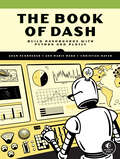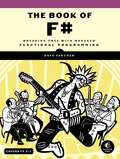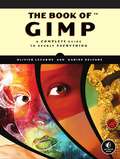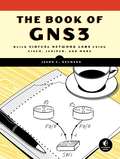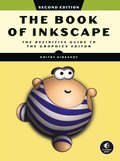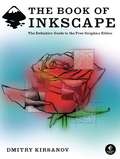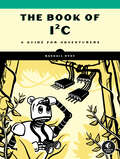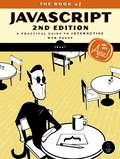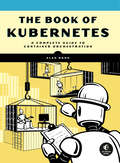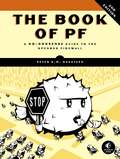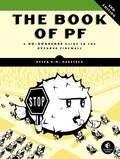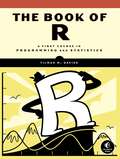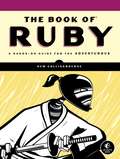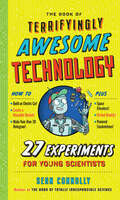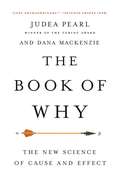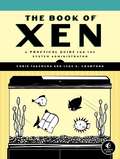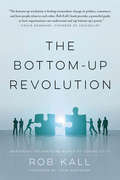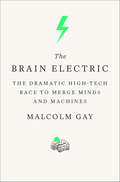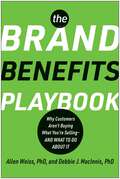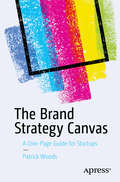- Table View
- List View
The Book of Dash: Build Dashboards with Python and Plotly
by Christian Mayer Adam Schroeder Ann Marie WardCreate stunning interactive dashboard applications in Python with the Dash visualization and data analysis tool. Build interfaces that make sense of your data, and make it pretty.A swift and practical introduction to building interactive data visualization apps in Python, known as dashboards. You&’ve seen dashboards before; think election result visualizations you can update in real time, or population maps you can filter by demographic. With the Python Dash library you&’ll create analytic dashboards that present data in effective, usable, elegant ways in just a few lines of code. The book is fast-paced and caters to those entirely new to dashboards. It will talk you through the necessary software, then get straight into building the dashboards themselves. You&’ll learn the basic format of a Dash app in a Twitter analysis dashboard that tracks numbers of likes over time. You&’ll then build up skills through three more sophisticated projects. The first compares world data in three areas: volume of internet usage, percentage of parliament seats held by women, and CO2 emissions; the second is a financial portfolio dashboard that models your investments; and the third is visualizesmachine learning algorithms. The final chapter sets you up with some useful final skills, like debugging your code and applying color themes. In this book you will:Create and run your first Dash appsUse the pandas library to manipulate and analyze social media and API dataCreate a variety of stunning and effective charts using PlotlyLearn to use bar charts, chloropleth maps, contour plots, and moreExamine and build on existing apps written by the pros Dash combines several technologies to get you building dashboards quickly and efficiently. This book will do the same.
The Book of Esports
by William CollisThe definitive guide to the modern world of competitive gaming and the official history of Esports™. Almost overnight, esports—or competitive video games—have exploded into the largest entertainment and sporting phenomenon in human history. The Book of Esports answers: What exactly are esports, and how did they become so popular so quickly?Why did blockbuster video games like League of Legends, Fortnite and Starcraft succeed?Where exactly is all this video gaming headed? What do gamers and college students need to know to position themselves for success in the industry?How do you create a billion-dollar esports business? What strategic choices drive success in the modern gaming industry?Can video games really get your kid into college? (All expenses paid, of course...) Whether you are a lifelong gamer, a curious Fortnite parent, or a businessperson seeking to understand the marketing opportunities of this multibillion-dollar phenomenon, The Book of Esports charts the rise of this exciting new industry, for the first time ever crafting a comprehensive overview of esports and its implications for human competition—and even the future of humanity itself. Gaming luminary and Harvard MBA William Collis has painstakingly translated esports&’ mysteries into a detailed and accessible testament for today. Featuring select interviews from the biggest names in the industry, The Book of Esportsweaves tales of trust, betrayal, and superhuman reflexes into predictive frameworks, explaining exactly why our industry looks the way it does, and how all this growth—and more—is inevitable as the divide between man and machine blurs into oblivion.
The Book of F: Breaking Free with Managed Functional Programming
by Dave FancherF# brings the power of functional-first programming to the .NET Framework, a platform for developing software in the Microsoft Windows ecosystem. If you're a traditional .NET developer used to C# and Visual Basic, discovering F# will be a revelation that will change how you code, and how you think about coding.In The Book of F#, Microsoft MVP Dave Fancher shares his expertise and teaches you how to wield the power of F# to write succinct, reliable, and predictable code. As you learn to take advantage of features like default immutability, pipelining, type inference, and pattern matching, you'll be amazed at how efficient and elegant your code can be.You'll also learn how to:-Exploit F#'s functional nature using currying, partial application, and delegation-Streamline type creation and safety with record types and discriminated unions-Use collection types and modules to handle data sets more effectively-Use pattern matching to decompose complex types and branch your code within a single expression-Make your software more responsive with parallel programming and asynchronous workflows-Harness object orientation to develop rich frameworks and interact with code written in other .NET languages-Use query expressions and type providers to access and manipulate data sets from disparate sourcesBreak free of that old school of programming. The Book of F# will show you how to unleash the expressiveness of F# to create smarter, leaner code.
The Book of GIMP: A Complete Guide to Nearly Everything
by Karine Delvare Olivier LecarmeGIMP is a free alternative to Adobe Photoshop with tons of professional-grade features. But with so many powerful tools and menu options, GIMP can be difficult to master. Whether you're struggling to get started or trying to master some of GIMP's more complex features, you'll find the answers you're looking for in The Book of GIMP.The tutorials in the first half of the book walk you through essential GIMP skills, like resizing and cropping images, touching up spots and scratches, and customizing your work area. Illustrated, step-by-step instructions show you how to:–Improve the lighting and composition of images–Remove distortions and noise to make old and damaged photos look like new–Create stunning panoramas and digital collages using a series of photos–Make, edit, and export custom textures, logos, and animated GIFs–Work with selections, channels, and masks to edit images like a pro–Create colorful digital art, layer by layerThe book's second half offers a comprehensive reference to GIMP's many features, including color balancing, masks, filters, and plug-ins. You'll find tools described in unparalleled detail, with coverage of nearly every option and parameter.With illustrated tutorials and detailed references, The Book of GIMP is sure to become your one-stop guide to just about everything GIMP.
The Book of GNS3: Build Virtual Network Labs Using Cisco, Juniper, and More
by Jason C. NeumannGNS3 is open source software that emulates Cisco router and switch hardware to simulate complex networks. You can use GNS3 on any computer to experiment with various router configurations, study for that next big Cisco certification, or build the ubernetwork of your wildest dreams—all without plugging in a single physical network cable.The Book of GNS3 will teach you how to harness the powerful GNS3 software to create your own virtual networks with Cisco and Juniper devices. Hands-on tutorials throughout show you how to:–Configure Cisco IOS and ASA devices in GNS3–Add Juniper routers to your projects with VirtualBox and QEMU–Connect GNS3’s hub, switch, and cloud devices to physical hardware–Integrate Cisco IOU virtual machines for advanced switching features–Simulate a Cisco access server to practice managing devices–Build bigger labs by distributing project resources across multiple computersWhy set up all of that expensive physical hardware before you know whether it will all work together? Learn how to build virtual networks with The Book of GNS3, and stop reconfiguring your lab every time you want to test something new.
The Book of Inkscape, 2nd Edition: The Definitive Guide to the Graphics Editor
by Dmitry KirsanovA comprehensive user&’s guide to Inkscape, a vector illustration application.Dmitry Kirsanov, a former core Inkscape developer, shares hisknowledge of Inkscape's inner workings as he shows how to useInkscape to draw with various tools, work with objects, apply realisticand artistic effects, and more. Step-by-step task-based tutorials showyou how to create business cards, animations, technical and artisticdrawings, and graphic assets for games.This second edition covers the new tools, improved text features,advanced new path effects and filters, as well as many new UIconveniences in Inkscape 1.0. A new chapter describes Inkscape'sextensions for both users and developers.Learn how to: • Navigate the canvas and customize your workspace and views • Create new objects and transform, style, clone, and combine them • Use gradients, patterns, filters, and path effects to liven up your work • Work with layers, groups, object order, and locks to control your artwork • View and manipulate your document&’s structure with the XML Editor and the new Objects dialog • Export your work to various formats
The Book of Inkscape: The Definitive Guide to The Free Graphics Editor
by Dmitry KirsanovThis is it. The complete and definitive guide to Inkscape, the free, vector-based graphics editor that competes with expensive drawing programs like Adobe Illustrator and CorelDRAW.In The Book of Inkscape, core Inkscape developer Dmitry Kirsanov shares his design experience and knowledge of Inkscape's inner workings as he walks you through the basics of using the program: drawing, working with objects, transformations and styling, adding text and shapes, and more. Kirsanov couples his detailed explanations with step-by-step tutorials that show you how to create business cards, animations, and technical and artistic drawings.In addition to the basics, Kirsanov teaches you how to:–Navigate the canvas and customize your workspace and views–Create new objects and then transform, style, clone, and combine them–Use drawing tools, strokes, and Bézier curves–Use gradients, patterns, filters, and path effects to liven up your work–Use the XML Editor to view and manipulate the structure of your artwork–Work with layers, groups, object order, and locks to control your images–Export your artwork to various formatsThis practical guide will show you how to harness Inkscape's powerful features to produce anything from a child's doodle to high-end, professional design projects. Now go ahead and draw something fun.
The Book of I²C: A Guide for Adventurers
by Randall HydeAn extensive practical guide to connecting real-world devices to microcontrollers with the popular I2C bus.If you work with embedded systems, you&’re bound to encounter the ubiquitous Inter-Integrated Circuit bus (IIC or I2C) – a serial protocol for connecting integrated circuits in a computer system. In The Book of I2C, the first comprehensive guide to this bus, bestselling author Randall Hyde draws on 40 years of industry experience to get you started designing and programming I2C systems. Aided by over 100 detailed figures and annotated source-code listings, you&’ll learn the I2C implementations of systems like Arduino, Teensy, and Raspberry Pi, as well as variants of the I2C and common I2C peripheral ICs complete with programming examples. For hardware hackers, electronics hobbyists, and software engineers of every skill level, the extensive coverage in this book will make it a go-to reference when it comes to connecting real-world devices to I2C microcontrollers.
The Book of JavaScript, 2nd Edition: A Practical Guide to Interactive Web Pages
by ThauJavaScript makes it easy to add interactivity, animation, and other tricks to your web pages. But this isn't just a book of JavaScripts for you to cut and paste into your HTML, only to find out that nothing works as you'd expected. Using real-world examples as the starting point, author thau! walks you step-by-step through various scripts and explains how they produce the effects you want.Because no discussion of JavaScript today is complete without coverage of Ajax Asynchronous JavaScript and XML), this thoroughly updated second edition includes new chapters on Ajax to get you up to speed with this valuable method for creating truly dynamic web pages.You'll also find revised appendices and new examples that reflect today's web environment. Learn to:– Work with frames, forms, cookies, and alarms– Use events to react to a user's actions– Perform image swaps and rollovers– Program your own functions to produce customized solutions– Store user preferences and build a shopping cart– Use Ajax to turn web pages into applicationsIf you need to spruce up tired-looking pages, The Book of JavaScript, 2nd Edition will help take your site from bland to brilliant.BONUS: Includes a complete reference to all JavaScript objects and functions, including examples, properties, methods, handlers, and browser compatibility!
The Book of Karen: Activities for Reactionary Adults
by Karen K. KlarenMazes Activities Games And more . . . ! Karen and Kevin demand a lot these days. From speaking to a manager to seeing birth certificates to requiring permits to sell lemonade, there's no 911 call they won't make, no social norm nor grace today's put-upon white person won't upend, in an effort to exercise and maintain their privilege. The Book of Karen: An Activity Book for Reactionary Adults demands only one thing: you laugh at them. Filled with the kinds of stickers, brain teasers, word searches, crossword puzzles, riddles, connect-the-dots, crafts, fill-in-the-blanks, and prompts found in any traditional adult activity book, The Book of Karen subverts and parodies the genre by highlighting the horrible behaviors of the entitled women and men whose videoed and memed behaviors would be comical were they not so condemnable. As much an activity book as as it is as call to action, The Book of Karen contains a comprehensive and useful list of anti-Karen nonprofits, especially those focusing on social justice, voting rights, pay equity, LGBTQIA rights, immigration, hunger and food instability, disability services, and victim's rights to raise awareness and for readers to support, learn more about, and work with to fight the status quo. A portion of the proceeds from The Book of Karen will directly go to benefit The Equal Justice Initiative, a non-profit committee working to end mass incarceration and excessive punishment, challenging racial and economic injustice, and protecting the basic human rights for the most vulnerable Americans.
The Book of Kubernetes: A Comprehensive Guide to Container Orchestration
by Alan HohnThis hands-on guidebook to the inner workings of containers peels back the layers to provide a deep understanding of what a container is, how containerization changes the way programs run, and how Kubernetes provides computing, networking, and storage.Containers ensure that software runs reliably no matter where it&’s deployed, and Kubernetes lets you manage all of your containers from a single control plane. In this comprehensive tour of the open-source platform, each chapter includes a set of example scripts with just enough automation to start your container exploration with ease. Beginning with an overview of modern architecture and the benefits of orchestration, you'll quickly learn how to create containers; how to deploy, administer and debug Kubernetes clusters all the way down to the OS; and how container networking works at the packet level across multiple nodes in a cluster.
The Book of PF, 2nd Edition: A No-Nonsense Guide to the OpenBSD Firewall
by Peter N.M. HansteenOpenBSD's stateful packet filter, PF, is the heart of the OpenBSD firewall and a necessity for any admin working in a BSD environment. With a little effort and this book, you'll gain the insight needed to unlock PF's full potential.This second edition of The Book of PF has been completely updated and revised. Based on Peter N.M. Hansteen's popular PF website and conference tutorials, this no-nonsense guide covers NAT and redirection, wireless networking, spam fighting, failover provisioning, logging, and more. Throughout the book, Hansteen emphasizes the importance of staying in control with a written network specification, keeping rule sets readable using macros, and performing rigid testing when loading new rules.The Book of PF tackles a broad range of topics that will stimulate your mind and pad your resume, including how to:– Create rule sets for all kinds of network traffic, whether it's crossing a simple LAN, hiding behind NAT, traversing DMZs, or spanning bridges or wider networks– Create wireless networks with access points, and lock them down with authpf and special access restrictions– Maximize flexibility and service availability via CARP, relayd, and redirection– Create adaptive firewalls to proactively defend against would-be attackers and spammers– Implement traffic shaping and queues with ALTQ (priq, cbq, or hfsc) to keep your network responsive– Master your logs with monitoring and visualization tools (including NetFlow)The Book of PF is for BSD enthusiasts and network administrators at any skill level. With more and more services placing high demands on bandwidth and an increasingly hostile Internet environment, you can't afford to be without PF expertise.
The Book of PF, 3rd Edition: A No-Nonsense Guide to the OpenBSD Firewall
by Peter N.M. HansteenOpenBSD’s stateful packet filter, PF, is the heart of the OpenBSD firewall. With more and more services placing high demands on bandwidth and an increasingly hostile Internet environment, no sysadmin can afford to be without PF expertise.The third edition of The Book of PF covers the most up-to-date developments in PF, including new content on IPv6, dual stack configurations, the "queues and priorities" traffic-shaping system, NAT and redirection, wireless networking, spam fighting, failover provision ing, logging, and more.You’ll also learn how to:–Create rule sets for all kinds of network traffic, whether crossing a simple LAN, hiding behind NAT, traversing DMZs, or spanning bridges or wider networks–Set up wireless networks with access points, and lock them down using authpf and special access restrictions–Maximize flexibility and service availability via CARP, relayd, and redirection–Build adaptive firewalls to proactively defend against attackers and spammers–Harness OpenBSD’s latest traffic-shaping system to keep your network responsive, and convert your existing ALTQ configurations to the new system–Stay in control of your traffic with monitoring and visualization tools (including NetFlow)The Book of PF is the essential guide to building a secure network with PF. With a little effort and this book, you’ll be well prepared to unlock PF’s full potential.
The Book of R: A First Course in Programming and Statistics
by Tilman M. DaviesThe Book of R is a comprehensive, beginner-friendly guide to R, the world’s most popular programming language for statistical analysis. Even if you have no programming experience and little more than a grounding in the basics of mathematics, you’ll find everything you need to begin using R effectively for statistical analysis.You’ll start with the basics, like how to handle data and write simple programs, before moving on to more advanced topics, like producing statistical summaries of your data and performing statistical tests and modeling. You’ll even learn how to create impressive data visualizations with R’s basic graphics tools and contributed packages, like ggplot2 and ggvis, as well as interactive 3D visualizations using the rgl package.Dozens of hands-on exercises (with downloadable solutions) take you from theory to practice, as you learn:–The fundamentals of programming in R, including how to write data frames, create functions, and use variables, statements, and loops–Statistical concepts like exploratory data analysis, probabilities, hypothesis tests, and regression modeling, and how to execute them in R–How to access R’s thousands of functions, libraries, and data sets–How to draw valid and useful conclusions from your data–How to create publication-quality graphics of your resultsCombining detailed explanations with real-world examples and exercises, this book will provide you with a solid understanding of both statistics and the depth of R’s functionality. Make The Book of R your doorway into the growing world of data analysis.
The Book of Ruby: A Hands-On Guide for the Adventurous
by Chris Takemura Huw CollingbourneRuby is famous for being easy to learn, but most users only scratch the surface of what it can do. While other books focus on Ruby's trendier features, The Book of Ruby reveals the secret inner workings of one of the world's most popular programming languages, teaching you to write clear, maintainable code.You'll start with the basics—types, data structures, and control flows—and progress to advanced features like blocks, mixins, metaclasses, and beyond. Rather than bog you down with a lot of theory, The Book of Ruby takes a hands-on approach and focuses on making you productive from day one.As you follow along, you’ll learn to:–Leverage Ruby's succinct and flexible syntax to maximize your productivity–Balance Ruby's functional, imperative, and object-oriented features–Write self-modifying programs using dynamic programming techniques–Create new fibers and threads to manage independent processes concurrently–Catch and recover from execution errors with robust exception handling–Develop powerful web applications with the Ruby on Rails frameworkEach chapter includes a "Digging Deeper" section that shows you how Ruby works under the hood, so you'll never be caught off guard by its deceptively simple scoping, multithreading features, or precedence rules.Whether you're new to programming or just new Ruby, The Book of Ruby is your guide to rapid, real-world software development with this unique and elegant language.
The Book of Terrifyingly Awesome Technology: 27 Experiments for Young Scientists (Irresponsible Science)
by Sean ConnollySean Connolly’s bestselling “genius at work” series gets its “T!” STEM, standing for Science, Technology, Engineering, and Mathematics, refers to the core non-humanities subjects that are so critical to contemporary education. And now, after covering everything but the technology, this master of fun, messy, possibly risky and compelling interactive science experiments explores twenty-seven key areas in current and near-future tech. Author of The Book of Totally Irresponsible Science, The Book of Massively Epic Engineering Disasters, and, most recently, The Book of Ingeniously Daring Chemistry Sean Connolly delves into the fascinating and potentially scary world of driverless cars, artificial intelligence, robots and androids, smart clothing, the “internet of things,” test-tube meat, the space elevator, and more. Through cool illustrations, quick definitions, illustrated panels, and Connolly's clear and always-lively writing, readers learn what each breakthrough means; how it has or will improve our lives; what other technologies are related to it; and what the terrifyingly awesome potential risks are. (3D printing? What happens when someone bad “prints” a weapon?) And to make the learning hands-on, each chapter includes an experiment to help understand the underlying principles of these incredibly complicated developments: Use milk jugs and balloons to test solar power. Food dye and water to understand genome technology. A paper airplane to gain insight into drones. Two boards and two friends to replicate the force of a powered exoskeleton. It’s science, down to a T.
The Book of Why: The New Science of Cause and Effect
by Judea Pearl Dana MackenzieA Turing Prize-winning computer scientist and statistician shows how understanding causality has revolutionized science and will revolutionize artificial intelligence"Correlation is not causation." This mantra, chanted by scientists for more than a century, has led to a virtual prohibition on causal talk. Today, that taboo is dead. The causal revolution, instigated by Judea Pearl and his colleagues, has cut through a century of confusion and established causality--the study of cause and effect--on a firm scientific basis. His work explains how we can know easy things, like whether it was rain or a sprinkler that made a sidewalk wet; and how to answer hard questions, like whether a drug cured an illness. Pearl's work enables us to know not just whether one thing causes another: it lets us explore the world that is and the worlds that could have been. It shows us the essence of human thought and key to artificial intelligence. Anyone who wants to understand either needs The Book of Why.
The Book of Xen: A Practical Guide for the System Administrator
by Chris Takemura Luke S. CrawfordXen, the open source virtualization tool, is a system administrator's dream. Xen is a free, high-performance virtual machine monitor that lets you consolidate your hardware and finally put those unused cycles to use—without sacrificing reliability, performance, or scalability.The Book of Xen explains everything you need to know in order to use Xen effectively, including installation, networking, memory management, and virtualized storage. You'll also learn how to use Xen and standard Linux tools to take snapshot backups, perform QoS operations on network traffic, and limit over-aggressive disk users.Authors Chris Takemura and Luke S. Crawford show you how to:–Provide virtual hosting for dozens of users, each with their own individual needs–Install and manage multiple guests, including various flavors of Linux, NetBSD, Solaris, and Windows–Choose the right virtual storage options for your needs–Migrate your systems seamlessly and create new images–Tune and benchmark your systems to make them as fast as possible–Troubleshoot Xen's most common problems like network and memory managementExpert advice is priceless when it comes to running a complicated open source virtualization technology like Xen. You'll get the advice you need in The Book of Xen.
The Bottom-up Revolution: Mastering the Emerging World of Connectivity
by Rob KallBarack Obama, Bernie Sanders, Hillary Clinton, George W. Bush, Sir Richard Branson, Steve Jobs, and Mark Zuckerberg have all said that that change or growth happen from the bottom up.But what does it mean and how do you do “bottom up” better and smarter? Bottom up is a way of life and a way of doing business. Bottom-Up: The Connection Revolution, picks up where Malcolm Gladwell’s Tipping Point left off. It is a how-to book for businesses, leaders, organizations, activists, and individuals, cracking wide-open humankind’s biggest trend in seven million years. By understanding the roots and implications of “bottom up” and “top down” you’ll be better able to tap the incredible power of this trend, as the billionaire founders of Google, Facebook, Craigslist and Twitter have done.
The Boy Who Could Change the World
by Lawrence Lessig Aaron SwartzIn his too-short life, Aaron Swartz reshaped the Internet, questioned our assumptions about intellectual property, and touched all of us in ways that we may not even realize. His tragic suicide in 2013 at the age of twenty-six after being aggressively prosecuted for copyright infringement shocked the nation and the world.Here for the first time in print is revealed the quintessential Aaron Swartz: besides being a technical genius and a passionate activist, he was also an insightful, compelling, and cutting essayist. With a technical understanding of the Internet and of intellectual property law surpassing that of many seasoned professionals, he wrote thoughtfully and humorously about intellectual property, copyright, and the architecture of the Internet. He wrote as well about unexpected topics such as pop culture, politics both electoral and idealistic, dieting, and lifehacking. Including three in-depth and previously unpublished essays about education, governance, and cities,The Boy Who Could Change the World contains the life's work of one of the most original minds of our time.
The Brain Electric: The Dramatic High-Tech Race to Merge Minds and Machines
by Malcolm GayThe gripping and revelatory story of the dramatic race to merge the human brain with machinesLeading neuroscience researchers are racing to unlock the secrets of the mind. On the cusp of decoding brain signals that govern motor skills, they are developing miraculous technologies to enable paraplegics and wounded soldiers to move prosthetic limbs, and the rest of us to manipulate computers and other objects through thought alone. These fiercely competitive scientists are vying for Defense Department and venture capital funding, prestige, and great wealth. Part life-altering cure, part science fiction, part military dream, these cutting-edge brain-computer interfaces promise to improve lives—but also hold the potential to augment soldiers' combat capabilities. In The Brain Electric, Malcolm Gay follows the dramatic emergence of these technologies, taking us behind the scenes into the operating rooms, start-ups, and research labs where the future is unfolding. With access to many of the field's top scientists, Gay illuminates this extraordinary race—where science, medicine, profit, and war converge—for the first time. But this isn't just a story about technology. At the heart of this research is a group of brave, vulnerable patient-volunteers whose lives are given new meaning through participating in these experiments. The Brain Electric asks us to rethink our relationship to technology, our bodies, even consciousness itself—challenging our assumptions about what it means to be human.
The Brand Benefits Playbook: Why Customers Aren't Buying What You're Selling--And What to Do About It
by Allen Weiss Deborah J. MacInnis2024 Global Book Awards Finalist From two of the world&’s leading experts on branding, brand benefits, and positioning, this strategic guide reveals how focusing on brand benefits can transform organizations and help them win in the marketplace. Today&’s customers think less about products and more about brands, no matter whether those brands are organizational, nonprofit, individuals, or service oriented. Customers also care less about the features of your product—what it has—than about its benefits—what it does for them. While this sounds like common sense, shockingly few organizations actually conduct business this way. Drs. Allen Weiss and Debbie J. MacInnis, professors and branding, brand benefits, and positioning experts, are about to change that. In The Brand Benefits Playbook, Weiss and MacInnis help readers understand, and transition to, a benefits-based model. This focus on customer benefits will teach organizations: What market they are in (or could be operating in) How customers perceive their brand (and that of their competitors) in terms of benefits The most effective way to segment a market and position a brand in terms of benefits How to deliver benefits throughout the customer journey How a focus on benefits facilitates growth Evidence-based, integrated, and simple, this innovative approach can be applied to all markets—and ensures that any brand can deliver the benefits its customers truly want.
The Brand Strategy Canvas: A One-Page Guide for Startups
by Patrick WoodsLaunching a startup is now easier than ever before. Building a lasting brand, however, remains a mystery for even the savviest of founders. An impactful, recognizable brand is perhaps a company’s most valuable intellectual property. And any strong brand starts with a strategy.The Brand Strategy Canvas has arrived to coach you beyond buzzword-laden tips and tricks, and instead offers you thorough, practical techniques to jump-start your strategy creation process. Author Patrick Woods distills fundamental questions to guide your strategy into a revolutionary single-page tool known as the titular Brand Strategy Canvas. The book takes you through each of the simple yet thought-provoking questions of the tool to develop your strategy, including considering audience insight, assessing benefits, creating a positioning statement, and identifying key messages. You will explore real-world case studies along the way and build a message map that ensures your organization drives home a consistent, clear, and authentic message to your target audience. No matter where you are in the business creation process, The Brand Strategy Canvas is the tool you need to build a brand from scratch that you can enthusiastically and effectively implement in real time. This book provides value to team members in companies of all sizes and stages, and is fit for any level of professional wanting to kickstart their entrepreneurial goals. A brand created today must be built for all of tomorrow’s possibilities, and The Brand Strategy Canvas is the book you will want by your side. What You Will LearnExamine the key differences between strategy and executionUnderstand how you can avoid brand debtCraft meaningful messages with the Features>Benefits ContinuumDevelop a positioning statement that differentiates from the competition and inspires your marketingDiscover your distinctive brand personality and how it impacts your marketing Equip your team with guidance and inspiration to ensure consistent and inspiring voice and personality throughout all your messaging Who This Book Is For This book is for startup founders who are looking for tools to help them build a brand their team can actually implement. This book will also resonate with and provide value to team members in tech companies of all sizes and stages.
The Brawler's Encyclopedia: An Unofficial Strategy Guide for Players of Brawl Stars
by Jason RichThe Must-Own Insider's Guide to the Gaming Sensation! Brawl Stars is one of the latest real-time multiplayer gaming phenomena to captivate players all over the world. Players team up in threes to navigate mazes, shoot at enemies, and collect colorful gem stones. In order to triumph, players must react quickly, aim precisely, and develop strategy to perform well in each three-minute match. To keep the game interesting, Brawl Stars offers several unique game play modes, each focusing on a different primary challenge. With the valuable tips in this illustrated, information-packed guide, gamers will be better equipped to: Develop strategies for success at each different level. Master the various playing arenas (mazes) and snag more wins. Take advantage of the unique features of each gameplay mode. The Brawler's Encyclopedia will introduce young readers to this exciting and challenging game. This full-color how-to guide includes hundreds of full-color screenshots showcasing some of the more collectible skins that can be unlocked or purchase and explaining all aspects of the game in a way that appeals to newbs and experienced gamers.
The Breakup 2.0: Disconnecting over New Media
by Ilana GershonA few generations ago, college students showed their romantic commitments by exchanging special objects: rings, pins, varsity letter jackets. Pins and rings were handy, telling everyone in local communities that you were spoken for, and when you broke up, the absence of a ring let everyone know you were available again. Is being Facebook official really more complicated, or are status updates just a new version of these old tokens? Many people are now fascinated by how new media has affected the intricacies of relationships and their dissolution. People often talk about Facebook and Twitter as platforms that have led to a seismic shift in transparency and (over)sharing. What are the new rules for breaking up? These rules are argued over and mocked in venues from the New York Times to lamebook. com, but well-thought-out and informed considerations of the topic are rare. Ilana Gershon was intrigued by the degree to which her students used new media to communicate important romantic information-such as "it's over. " She decided to get to the bottom of the matter by interviewing seventy-two people about how they use Skype, texting, voice mail, instant messaging, Facebook, and cream stationery to end relationships. She opens up the world of romance as it is conducted in a digital milieu, offering insights into the ways in which different media influence behavior, beliefs, and social mores. Above all, this full-fledged ethnography of Facebook and other new tools is about technology and communication, but it also tells the reader a great deal about what college students expect from each other when breaking up-and from their friends who are the spectators or witnesses to the ebb and flow of their relationships. The Breakup 2. 0 is accessible and riveting.
